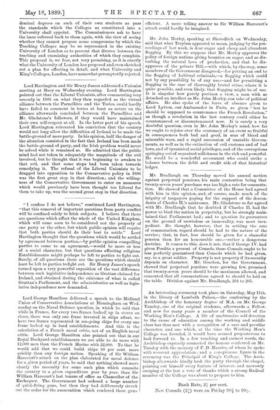Mr. Bradlangh on Thursday moved his annual motion against perpetual
pensions, his main contention being that twenty-seven years' purchase was too high a rate for commuta- tion. He showed that a Committee of the House had agreed with him in this opinion, and, of course, made much of the iniquity of taxpayers paying for the support of the descen- dants of Charles IL's mistresses. Mr. Gladstone so far agreed with Mr. Bradlaugh that he doubted if Charles II. had the power to bind the nation in perpetuity, but he strongly main- tained that Parliament had ; and to question its guarantees on the ground of unwisdom or immorality, was most inex- pedient. He thought, however, that in settling the rate of commutation, regard should be had to the nature of the service; that, in fact, less should be given for a shameful pension than for an honourable one,—rather a dangerous doctrine. It comes to this, does it not, that if George IV. had given Perdita a present of Consols, those Consols ought to be less perfectly guaranteed than Consols which he had given, say, to a great soldier. Property is not property if its security depends on character. Mr. Goschen, for the Government, showed that perpetual pensions were growing few, promised that twenty-seven years should be the maximum allowed, and consented that all commutations agreed to should be laid on the table. Division against Mr. Bradlaugh, 264 to 205.


































 Previous page
Previous page